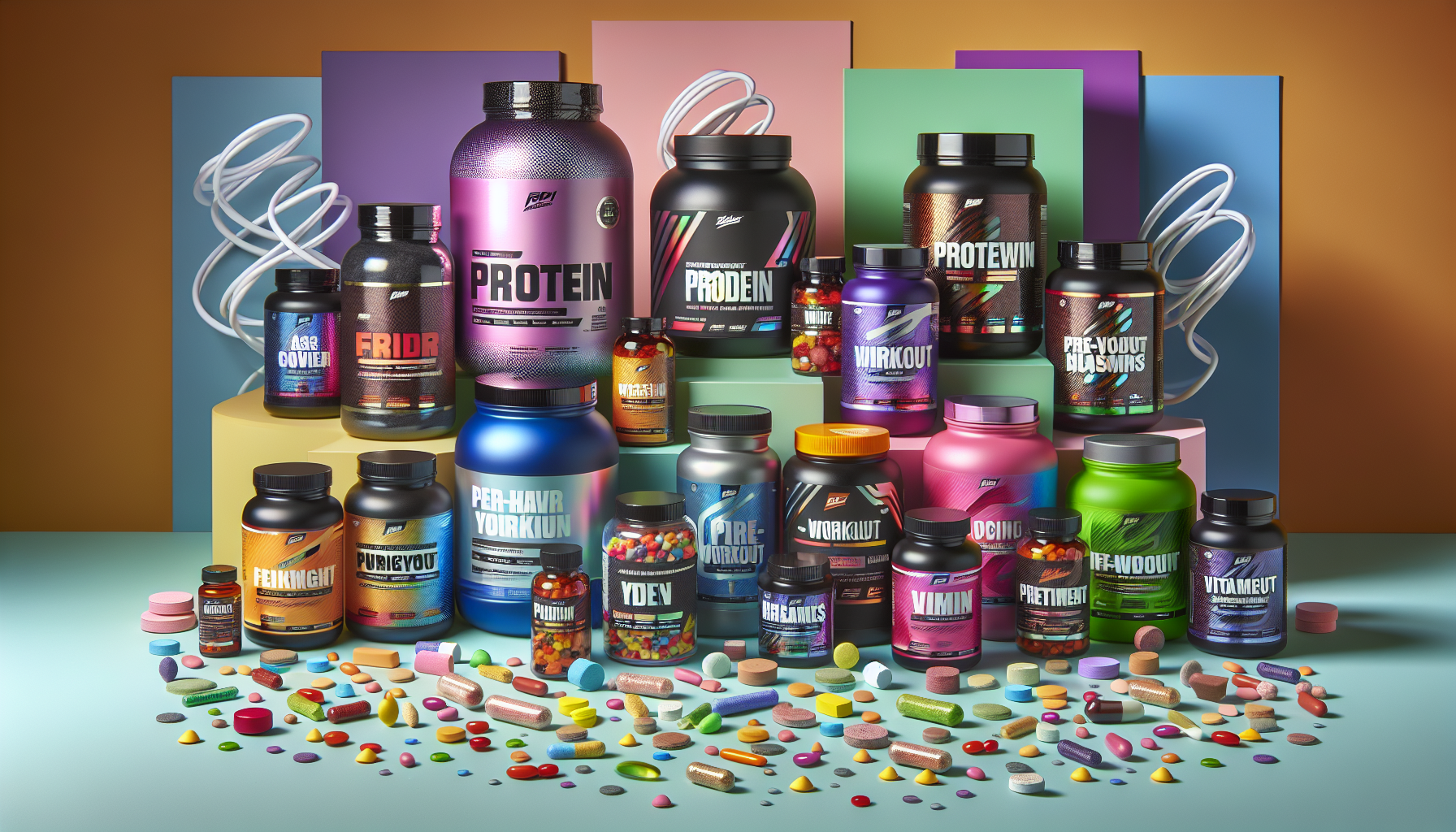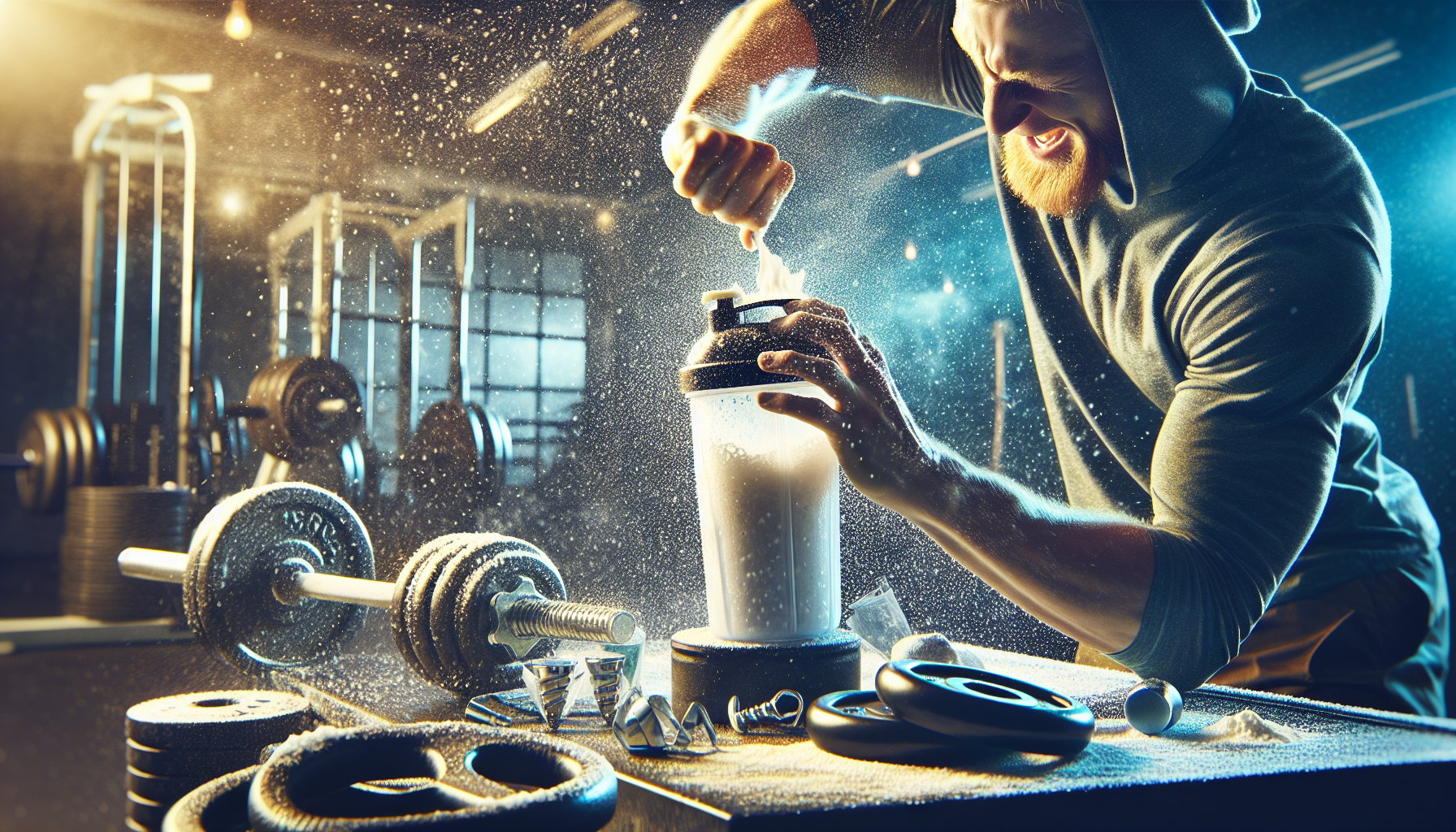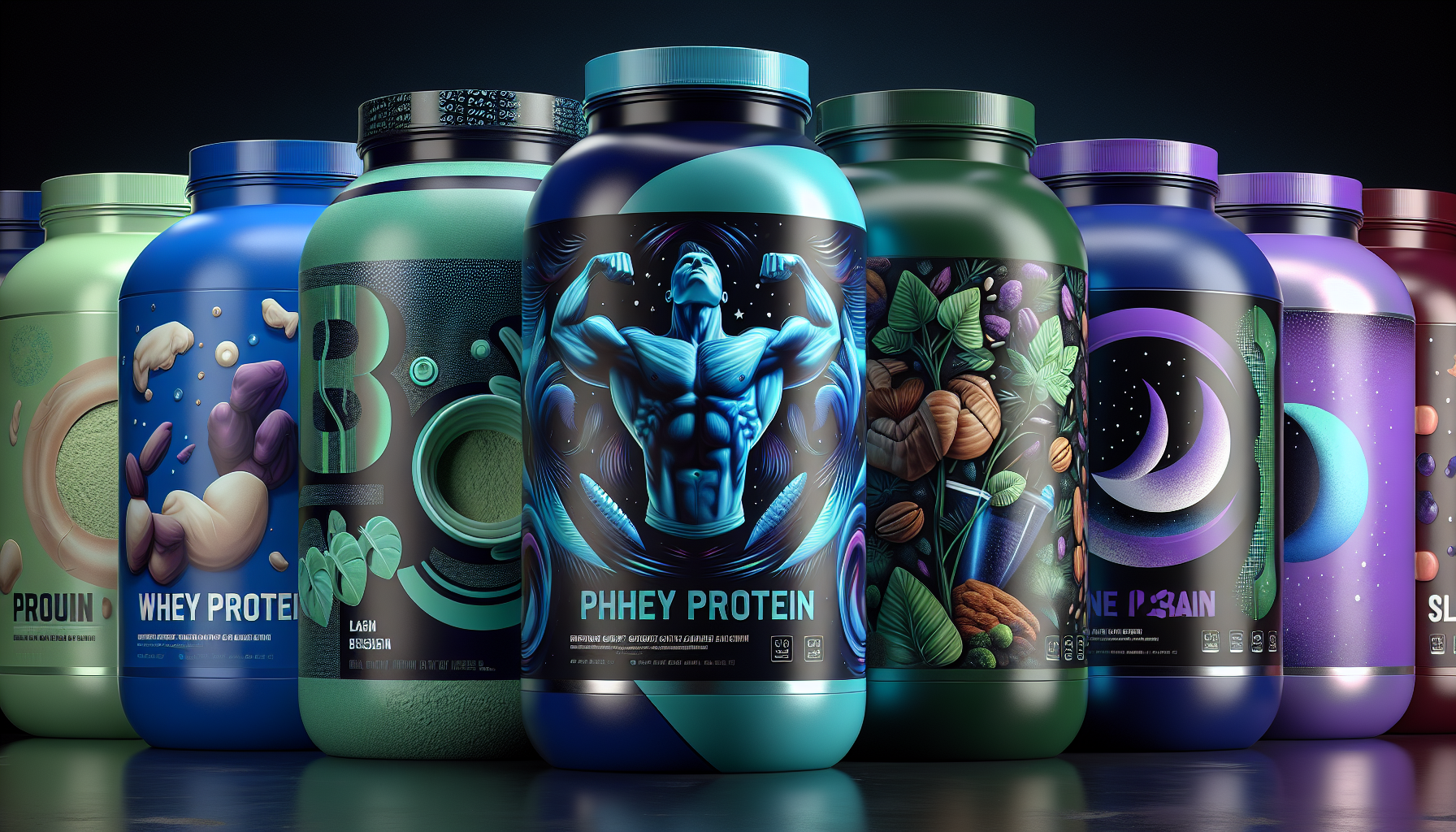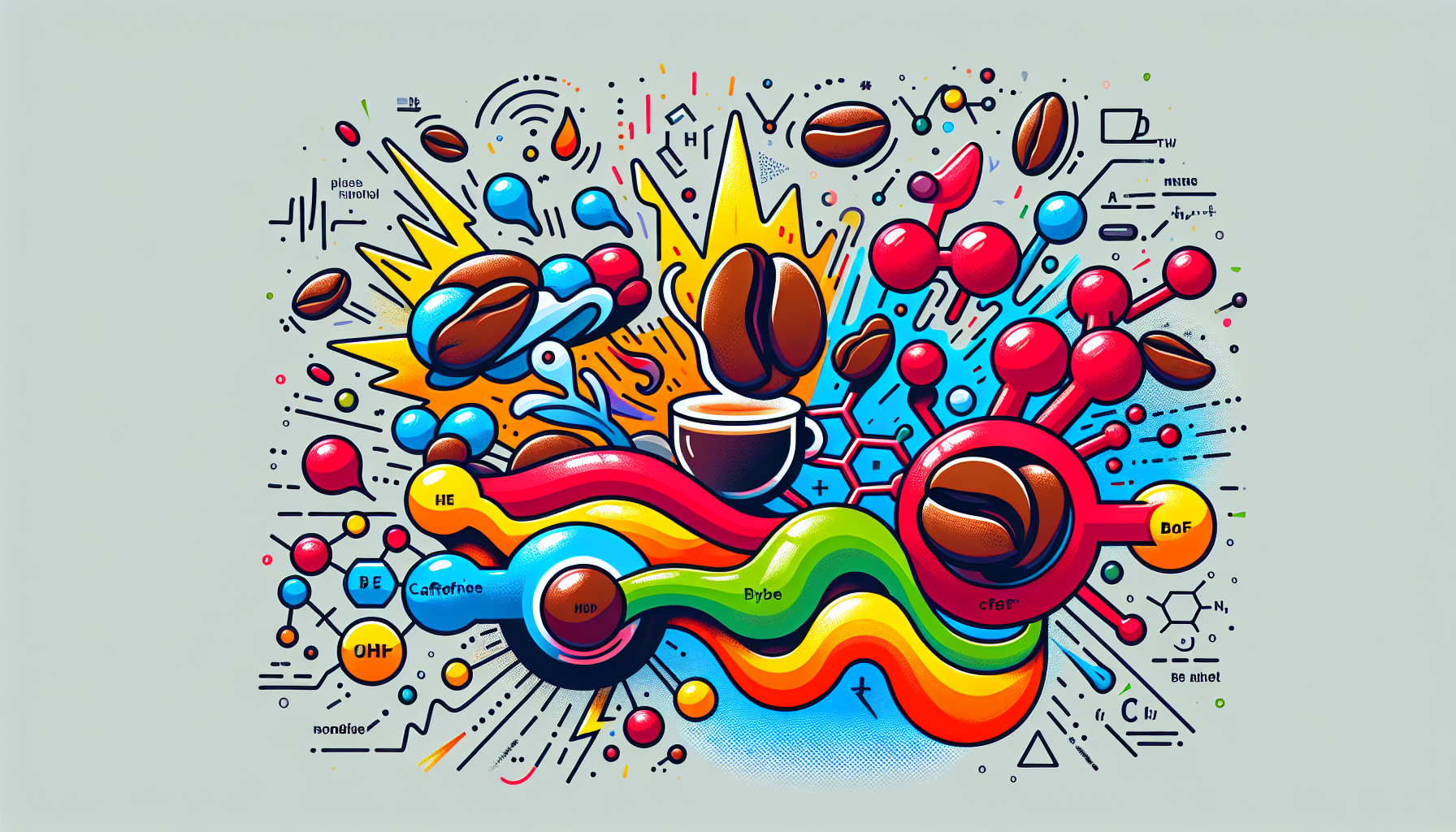Choosing the Right Fitness Supplements
Maximizing Your Workout: Choosing the Right Fitness Supplements for Optimal Health
Wondering which fitness supplements can take your workout to the next level? You’re in the right place. From building muscle to increasing endurance, we’ll guide you through the essentials of choosing supplements that align with your fitness goals and support your health without the fluff.
Key Takeaways
- Fitness supplements like protein powders and pre-workouts can enhance workout performance and recovery, but require a careful balance to avoid health risks and side effects.
- Choosing the right supplement involves aligning personal fitness goals with nutritional needs and may benefit from the guidance of Registered Dietitian Nutritionists or other healthcare professionals.
- Nutrient-dense whole foods and proper hydration remain fundamental for health, and supplements are not a substitute for a balanced diet and regular exercise.
Understanding Fitness Supplements

Harnessing the power of fitness supplements can turn a good workout into a great one. Like a trusted ally, these supplements stand by ready to enhance energy, focus, and performance during exercise. But before we dive into the sea of bottles and powders, let’s anchor down and understand the foundational elements that make up this diverse category of fitness aids.
Types of Fitness Supplements
Wading through the myriad of fitness supplements requires a discerning eye, especially when evaluating ingredient labels and serving sizes. It’s all too easy to get lost in proprietary blends that shroud the true nature of the ingredients within. This is why checking for ‘Supplement Facts’ or ‘Nutrition Facts’ becomes a beacon of transparency, guiding you to make informed choices for your strength training regimen.
Benefits and Risks
As with any voyage, there are benefits to reap and risks to avoid. Supplements can bring about a range of improvements from enhanced recovery to bolstered performance, provided they are backed by solid research. However, the tide can turn quickly if these aids are misused, leading to health conditions, stress on various organs, and a disruption in the delicate balance of life.
Pre-workout supplements, for example, though beneficial, can sometimes push you towards the rocky shores of anxiety and poor rest. It’s essential to navigate these waters with care, ensuring that the pursuit of strength does not lead to the risk of disease or the inflammation of psychological issues. Getting enough sleep is crucial in maintaining a healthy balance, so it’s important to consider how much sleep you need and avoid short sleep duration.
Choosing the Right Supplement for Your Needs
Selecting the right supplement is a quest for alignment between your goals, nutritional needs, and the products you choose to consume. It’s a journey that begins with a map drawn from your personal fitness aspirations, guiding your research towards ingredients that will complement your voyage.
In the evolving landscape of personalized formulations, finding a supplement that fits your genetic makeup and metabolism is like discovering a treasure chest tailored just for you.
Assessing Your Nutritional Needs
Setting sail with a cargo of nutritious food is the first step in any fitness journey. Vitamins and nutrients are the building blocks of our health, yet our diet may not always provide them in the necessary amounts. This is where a skilled navigator, in the form of a Registered Dietitian Nutritionist, comes into play, helping us to determine the right course and supplementation to fill any nutritional voids.
Setting Realistic Goals
Charting a course with realistic fitness goals is like setting your sails to the right wind—they must be ambitious yet attainable, ensuring that the supplements we choose are in harmony with our exercise objectives and desired outcomes. Like any skilled sailor, we must adjust our course as needed, setting smaller, incremental benchmarks to maintain motivation and achieve our long-term objectives.
Popular Fitness Supplements and Their Uses

Amid the vast ocean of supplements, certain stars guide us reliably. Creatine, pre-workouts, and protein powders are like the North Star for those navigating the path of muscle building, weight loss, and endurance improvement. These popular supplements are the trusted crew-mates that support us in our quest for strength training success.
Protein Powders

Protein powders are the steadfast companions in our fitness journey, aiding in muscle building, tissue repair, and the production of enzymes and hormones. They come in forms as diverse as the seas from whey to soy to pea each with their unique properties that contribute to our nutrition and help us maintain weight or reduce toxins.
Protein Powders for muscle building after workouts!
This section is written by Artur Kyrcz
With numerous protein choices available, selecting the right one can be confusing yet important. Therefore, it’s wise to give it a bit more thought, so let us dive into it.
After an intense workout, your muscles can feel sore and tired because you’ve pushed them to their limits. But that soreness is actually a sign that your muscles are ready to grow stronger. Here’s how it works: When you exercise, especially if you’re doing strength training like lifting weights, you create tiny tears in your muscle fibers. This will prompt your body to release growth hormone, which is crucial for repairing muscles rapidly. This window, often referred to as the anabolic window, peaks up to 60 minutes after your workout, making it the prime time for muscle repair and recovery.
In the realm of nutritional science this is where protein powders such as whey concentrates, whey isolates, hydrolyzed whey, casein, beef, plant, grain and seed blend based proteins represent fundamental components of our dietary landscape for muscle recovery. These powders are rapidly absorbed into the bloodstream allowing the liver to break them down into amino acids, the building blocks of all protein so that you have the best recovery possible. But which one will suit your needs without causing any distress (i.e. bloating, gas)?
First off, let’s talk about whey concentrates that pack about 23-24g of protein per serving.
These will usually be better in taste and have a thicker texture because of the lactose content that will contain a little bit more of that sugar and carbohydrate which will also slow down the digestion. But here’s the thing – if you’re lactose intolerant, these concentrates may not be for you. Why you might ask? Well the lactose is still intact so they may give you some trouble digesting, leading to stomach issues like discomfort, bloating, and gas. So while they’re great for some people, those with lactose intolerance need to be a bit cautious or pay the (gas)-equences.
Moving forward whey protein isolates are highly refined forms of protein that are very easy to digest at a fairly fast speed. They undergo a filtration process to remove most of the non-protein components, resulting in a product with a high protein content, typically around 27-30g protein per serving. This purity makes protein isolates an excellent choice for individuals aiming to increase their protein intake without consuming excess calories or other macronutrients. These protein isolates can be beneficial for individuals with dietary restrictions or those seeking a convenient and easily digestible protein source that will not cause the problems often associated with the protein whey concentrates.
Hydrolyzed whey protein isolates are protein derivatives that undergo hydrolysis, a process that breaks down large protein molecules into smaller peptides. This pre-digestion makes the protein easier for the body to absorb and is considered the fastest absorbing. With a high protein percentage similar to regular isolates, typically around 90-95%, hydrolyzed whey protein isolates are considered to be the most expensive but with the least amount of disturbances in digestion.
Casein protein, also derived from milk, is renowned for its slow digestion rate, forming a thick substance in the stomach that gradually releases amino acids into the bloodstream. This prolonged release makes it perfect for situations requiring a steady amino acid supply, like before bedtime or between meals. Not only does casein stimulate protein synthesis, aiding muscle repair and growth, but it also promotes a sense of fullness, enhancing its value in a balanced diet and workout program. Though its protein percentage can vary, typically ranging from 70% to 90%, providing around 23-25g of protein per serving, those with lactose intolerance should exercise caution due to potential similar effects to protein whey concentrates.
Shockingly this next protein has been the biggest surprise of them all. Beef protein that is processed to remove most of the non-protein components, resulting in a highly concentrated protein product. Many companies source the amino acids from bone broth and hydrolyzed beef collagen that also help with skin, hair, nails and joints. Typically containing around 25-26g per serving. Additionally, beef proteins are suitable for those with dietary restrictions, such as lactose intolerance or allergies to other protein sources like whey and other plant based proteins.
Finally, in harmony with nature’s design, earthy vegan protein powders derive from an array of plant, grain, and seed blends, presenting a vegan-friendly alternative to animal-based proteins. Extracted from sources like peas, rice, hemp, pumpkin, and chia and others, these powders offer a dense protein source, typically boasting 20-25 grams per serving. Valued for their high protein content and potential health benefits, including naturally low fat and cholesterol levels, plant-based and seed protein powders cater to vegetarians, vegans, and those with dairy or lactose intolerances. While individual plant proteins like hemp or pumpkin seed for an example may lack in isolation for optimal protein synthesis, their combined force yields a comprehensive amino acid profile rivaling that of animal-based counterparts.
Ultimately, everyone has unique needs and preferences. For some, taste will be a significant factor, while others may prioritize dietary restrictions. It’s essential for individuals to stay informed by asking questions and seeking guidance from knowledgeable professionals at their local supplement store. Through trial and error, each person will discover their ideal formula. However, regardless of individual differences, adequate protein intake is crucial for muscle maintenance and growth in any muscle-building or sustaining regimen. So, with that said, it’s time to start exploring and sampling to find what works best for you.
Pre-Workout Formulas
This section is written by Artur Kyrcz

To pre-workout or not to pre-workout, that’s the recurring question. Before diving in, it’s wise to consider a few key factors. Firstly, reflect on your fitness goals and what you hope to achieve with a pre-workout supplement. Next, take a close look at the ingredients to ensure they align with your needs and any sensitivities you may have. Assess your tolerance levels, especially to stimulants like caffeine, and determine the appropriate timing and dosage for your workouts.
You might want to avoid consuming a pre-workout several hours before bedtime, as the stimulating effects could interfere with your ability to fall asleep. In such situations, opting for a
caffeine-free pre-workout might be a better choice. It’s important to note that pre-workouts are not solely defined by caffeine; there are various other components that contribute to their effectiveness.
A pre-workout can be divided into several categories, each serving a specific purpose. Pump ingredients, such as Arginine, Red Beets, Citrulline, Agmatine sulfate, and Glycerol, work to dilate veins and increase nitric oxide production, enhancing blood flow and muscle pumps during workouts.
Nootropics encompass substances that alter cognitive function, including caffeine, theanine, lion’s mane, Alpha GPC, and theacrine, among others. These ingredients help improve focus, alertness, and mental clarity during exercise.
Endurance and strength enhancers, such as beta-alanine and creatine, play vital roles in performance optimization. Beta-Alanine aids in buffering lactic acid buildup in muscles, delaying fatigue, while creatine supports ATP production in the Kreb cycle, boosting energy levels for intense workouts.
Additionally, some pre-workouts incorporate thermogenics to increase body temperature, promote sweating, and facilitate fat burning. Ingredients like Carnitine, bitter orange, and Gamma Butyrobetaine EEC (GBB) help mobilize fatty acids from the bloodstream to be utilized for energy production within the mitochondria, ultimately enhancing overall energy expenditure during exercise.
It’s important to be mindful of your overall health when choosing a pre-workout. Some ingredients may be too potent for your system, so it’s essential to start with a small dose and gradually increase if needed. Seek advice from multiple sources, such as local supplement stores, to gather different perspectives and insights.
Watch out for signs of tolerance build-up or dependency, particularly with caffeine. If you find yourself needing more to feel the same effects, it might be time to reevaluate or take a break from your pre-workout supplement. Consider caffeine-free alternatives that still offer performance benefits, or explore nootropics for cognitive enhancement without the stimulating effects.
Listen to your body and be mindful of any changes in energy levels, stress, or mood. If you notice any negative effects, it’s essential to reassess and make adjustments accordingly. Ultimately, the decision to use pre-workout supplements is personal and should be based on your individual needs, preferences, and health considerations
Supplements during workouts for recovery and energy output.
This section is written by Artur Kyrcz
As you step into the gym, you notice everyone seems to be sipping on something. While some might have plain water, you begin to wonder if there’s more to it as your own energy starts to drastically drop earlier than anticipated. Meanwhile, others around you seem to be powering through their workouts effortlessly. Curiosity piqued, you find yourself contemplating what’s in their bottles. Let’s take a closer look at Intra-Workout supplements to unravel this mystery.
Intra-workout supplements are renowned for their multifaceted roles in the body, aimed at boosting recovery and performance during exercise. Typically ingested during workouts, these supplements deliver essential nutrients such as amino acids and electrolytes for hydration. These components contribute to elevated energy levels and facilitate muscle recovery.
Let’s delve deeper into optimizing recovery with Branch Chain Amino Acids (BCAAs), a trio of essential amino acids characterized by their branched chemical structure: Leucine, Isoleucine, and Valine. During resistance or high-intensity exercise, cortisol levels rise, leading to the breakdown of these amino acids. While your body has its process of recycling them for muscle repair, supplementing with BCAAs ensures rapid absorption, expediting the recovery process. This supplementation facilitates quicker recovery, and as the anabolic window (30-60 minutes post workout ) persists, any remaining BCAAs are utilized for further muscle repair and growth.
Let’s clarify the concept of EAAs. EAAs, acronym for Essential Amino Acids, are a set of nine amino acids vital for our bodies functions. Our bodies do not produce them and thus must be obtained through diet or supplements. These nine amino acids include: Isoleucine, Leucine, Valine, Lysine, Methionine, Phenylalanine, Threonine, and Tryptophan, Histidine.
Similar to BCAAs, the first three amino acids—Leucine, Isoleucine, and Valine—are significant, with Leucine being particularly crucial as it serves as the primary driver for protein synthesis (muscle recovery).
The remaining essential amino acids play critical roles in various physiological functions, immune health, and neurotransmitter production. They also contribute significantly to muscle recovery and adaptation to exercise. Incorporating essential amino acids into your supplementation regimen, either individually or alongside other nutrients, can significantly enhance overall recovery and well-being. This can lead to a heightened eagerness to return to the gym and a greater enjoyment of workouts due to expedited recovery processes.
Lastly, one of the crucial elements for both energy and recovery is maintaining electrolyte balance. Potassium and sodium, often referred to as the “pump,” are pivotal during physical activity. A 2:1 ratio of potassium to sodium is optimal, mirroring the body’s natural pump mechanism. Depletion of either electrolyte can lead to fatigue, irregular heartbeats, or even hypertension (high or raised blood pressure). When we sweat, we lose these electrolytes, emphasizing the need to replenish them to sustain physical activity.
Alternative Pre-Workout Options from Nature
If you’re inclined toward natural food sources for your pre-workout needs, it’s best to opt for light snacks. This ensures that blood isn’t diverted from your muscles to your digestive system during your workout. Some of our top picks include beets, ginger, and turmeric, which make for an excellent pre-workout combination. One simple method is to boil beets with fresh ginger and turmeric until fully cooked, then allow it to cool before consuming it as part of your pre-workout nutrition. For added flavor, a drizzle of maple syrup can be a delightful touch. The key here is to keep your pre-workout snack light and consume it about 45 minutes before you begin your training session.
Inter-workout supplements
Inter-workout supplements are designed to be consumed during your workout to help sustain energy levels, enhance endurance, and support muscle recovery. Here are a few examples:
1. BCAAs (Branched-Chain Amino Acids): BCAAs, including leucine, isoleucine, and valine, are essential amino acids that play a crucial role in muscle protein synthesis. Consuming BCAAs during your workout can help reduce muscle breakdown and promote muscle repair and growth.
2. Electrolytes: Electrolytes such as sodium, potassium, and magnesium are lost through sweat during exercise. Replenishing these electrolytes during your workout can help maintain hydration, support muscle function, and prevent cramping.
3. Carbohydrates: Consuming carbohydrates in the form of fast-digesting sugars like dextrose or maltodextrin can provide a quick source of energy during prolonged or intense workouts. Carbohydrates help replenish glycogen stores and maintain blood glucose levels, delaying fatigue and supporting performance.
4. Hydration Formulas: Hydration formulas typically contain a blend of electrolytes and carbohydrates to help maintain fluid balance, replace lost electrolytes, and provide energy during exercise. They can be particularly beneficial during long-duration or high-intensity workouts.
5. Caffeine: Caffeine is a natural stimulant that can enhance focus, alertness, and performance during exercise. Consuming caffeine in moderation during your workout can help increase endurance, reduce perceived exertion, and improve overall workout quality.
Incorporating these inter-workout supplements into your routine can help optimize performance, promote recovery, and support your fitness goals. As always, it’s essential to consult with a healthcare professional or registered dietitian before adding any new supplements to your regimen, especially if you have underlying health conditions or are taking medications.
Post workout supplements and recovery
Post-workout supplements play a vital role in optimizing recovery and promoting muscle growth after intense exercise. Here are some common types of post-workout supplements and their benefits:
1. Protein Powder: Protein is essential for muscle repair and growth. Whey protein, casein protein, and plant-based protein powders are popular choices for post-workout supplementation. Whey protein is quickly absorbed, making it ideal for fast recovery, while casein protein provides a slow release of amino acids, supporting muscle repair over a longer period. Plant-based protein powders are suitable for vegans and individuals with lactose intolerance.
2. Branched-Chain Amino Acids (BCAAs): BCAAs, including leucine, isoleucine, and valine, are essential amino acids that promote muscle protein synthesis and reduce muscle protein breakdown. Supplementing with BCAAs can help accelerate recovery, reduce muscle soreness, and preserve lean muscle mass.
3. Creatine: Creatine is a naturally occurring compound that helps replenish adenosine triphosphate (ATP) stores in muscles, allowing for increased energy production during high-intensity exercise. Taking creatine post-workout can aid in muscle recovery, enhance strength and power, and support muscle growth over time.
4. Glutamine: Glutamine is the most abundant amino acid in the body and plays a crucial role in immune function and muscle recovery. Supplementing with glutamine post-workout may help reduce muscle soreness, support immune function, and enhance glycogen replenishment.
5. Carbohydrate Supplements: Carbohydrates are the body’s primary source of energy during exercise, and consuming carbohydrates post-workout can help replenish glycogen stores and promote recovery. Fast-digesting carbohydrates such as dextrose or maltodextrin are commonly used in post-workout supplements to facilitate rapid glycogen replenishment and muscle recovery.
6. Electrolyte Supplements: Electrolytes, including sodium, potassium, magnesium, and calcium, are lost through sweat during exercise. Replenishing electrolytes post-workout is essential for maintaining hydration, supporting muscle function, and preventing cramping and fatigue. Electrolyte supplements or sports drinks can help restore electrolyte balance after intense exercise.
7. Omega-3 Fatty Acids: Omega-3 fatty acids, found in fish oil supplements, have anti-inflammatory properties that can aid in reducing exercise-induced inflammation and muscle soreness. Supplementing with omega-3 fatty acids post-workout may support joint health, enhance recovery, and reduce the risk of overtraining injuries.
Incorporating these post-workout supplements into your nutrition plan can help optimize recovery, promote muscle growth, and support overall athletic performance. It’s essential to consult with a healthcare professional or registered dietitian before starting any new supplement regimen to ensure it aligns with your individual health and fitness goals.
Vitamin D and Other Minerals
Vitamin D and other minerals are the sunlight that nurtures our body’s garden, playing a crucial role in muscle function and overall health. Adequate levels of vitamin D are like fertile soil, reducing inflammation and helping prevent injuries that can be detrimental to an athlete’s career.
Natural Alternatives to Fitness Supplements
As we chart our course towards fitness, it’s essential to remember that supplements are companions, not captains. They do not replace the need for a balanced diet and regular exercise.
Natural alternatives like nutrient-dense foods, such as the athletes kitchen diet, and proper hydration are essential for maintaining healthy blood sugar levels and serve as the true north of our health compass, steering us away from junk food and supporting our immune system as well as our mental health.
Nutrient-Dense Foods
While supplements can fill in the nutritional gaps, whole foods like meats, grains, legumes and all vegetables in different colours and shapes are the mainstays of a healthy diet, providing a broad spectrum of essential vitamins and minerals. These nutrient-dense foods are the anchors that keep our health stable amidst the waves of life.
Organic Meal Delivery Service
Athletes Kitchen is not just a meal delivery service; it’s a lifestyle choice aimed at promoting health and wellness. As a small Canadian business, we take pride in crafting meal kits and fully cooked meals that support a healthy lifestyle. Our philosophy is simple: start with real food, cook with healthy alternatives, ensure portion control, and deliver meals that are conveniently ready to eat.
The Science Behind the Meals
We don’t just throw ingredients together; our meal plans are carefully curated with the expertise of Registered Dietitian Nutritionists. This collaboration blends food and science to create portions and food pairings that help you feel your best and live your best life. From balancing macronutrients to choosing the right ingredients, every aspect of our meals is designed with your health in mind.
Convenience Meets Sustainability
Athletes Kitchen makes healthy eating easy with our convenient meal delivery service. Our biodegradable meal kits not only make it simple to enjoy nutritious meals but also contribute to a healthier planet. By choosing organic ingredients and sustainable packaging, we strive to make a positive impact on both your health and the environment.
Enhancing Health and Well-Being
Our meals offer more than just sustenance; they contribute to better immune function, improved sleep quality, and overall well-being. With dishes inspired by cuisines from around the world, including the Mediterranean diet, our meals provide a diverse array of nutrients to support optimal health.
Supporting Your Body’s Needs
Portion-controlled meals can have a significant impact on various aspects of health, including circadian rhythm, digestion, and energy levels. By preventing digestive issues, fatigue, and other stressors on the body, our meals help you maintain balance and vitality in your everyday life.
In conclusion, Athletes Kitchen’s organic meal delivery service goes beyond just delivering food; it’s about nourishing your body and supporting your health goals. With our commitment to quality ingredients, sustainable practices, and scientific approach to nutrition, we empower you to eat well, live well, and thrive.
The Importance of Nutritious Food for Overall Health
In today’s fast-paced world, maintaining a balance in our diet is crucial for optimal health. The food we consume not only fuels our body but also affects our mental health and overall well-being. Athletes Kitchen understands the significance of nutritious meals in promoting a healthy lifestyle.
Balanced Diets and Nutrient-Rich Meals
Our meal kits are carefully crafted to provide a balance of essential nutrients, including vitamins, minerals, proteins, and carbohydrates. Each meal is designed to nourish the body and support overall health. By consuming a variety of nutrient-rich foods, we can ensure that our body gets the necessary fuel it needs to function at its best.
The Role of Minerals in Health
Minerals play a vital role in various bodily functions, including bone health, muscle function, and metabolism. However, many diets may lack sufficient minerals, leading to symptoms such as fatigue and weakness. Athletes Kitchen meals are rich in essential minerals, helping to support overall health and prevent deficiencies.
The Impact of Salt on Health
While salt is an essential mineral, consuming it in excess can negatively affect health, leading to conditions such as high blood pressure and heart disease. At Athletes Kitchen, we use salt in small amounts to enhance flavour without compromising on health. Our meals are carefully balanced to provide just the right amount of salt for optimal taste and nutrition.
Cooking for Health and Wellness
Cooking nutritious food at home is an excellent way to take control of your diet and promote overall health. Athletes Kitchen provides convenient meal kits that make it easy to prepare delicious and nutritious meals at home. With our recipes and ingredients, you can enjoy homemade meals that nourish your body and support your wellness goals.
Improving Sleep and Mental Health
Consuming nutritious meals can also have a positive impact on sleep and mental health. Research shows that a balanced diet rich in whole foods can improve sleep quality and reduce symptoms of anxiety and depression. By prioritizing nutritious food, we can support both our physical and mental well-being.
In summary, prioritizing nutritious food is essential for maintaining overall health and well-being. Athletes Kitchen is committed to providing balanced, nutrient-rich meals that support optimal health and vitality. With our convenient meal kits, cooking nutritious meals at home has never been easier.
Hydration and Electrolytes
Maintaining proper hydration and electrolyte balance is like keeping our ship’s hull intact, it’s crucial for staying afloat and performing at our best. Drinking water, monitoring urine colour, and replenishing lost fluids are the basic navigational skills every fitness enthusiast must master. Managing alcohol intake can also play a role in maintaining proper hydration.
Consultation with Qualified Healthcare Professionals

Even the most seasoned sailors need a lighthouse to guide them safely to shore, and in our fitness journey, that beacon is the advice of a qualified healthcare professional. They help us chart a safe course through the supplement seas, ensuring we don’t encounter unforeseen health conditions or adverse effects.
Medical Community Recommendations
Heeding the advice of the medical community is like consulting the stars for navigation; it ensures that we stay on the right course, benefiting from supplements while avoiding potential health conditions. This guidance is our compass, helping us maintain balance and health as we pursue our fitness goals.
Monitoring Progress and Adjusting as Needed
Adjusting our sails as we go, with regular updates and discussions with healthcare providers, helps us stay on course and adapt our supplement regimen to ensure progress and safety. This ongoing conversation is the rudder that keeps our fitness journey on track.
Summary
Our journey across the vast and sometimes challenging waters of fitness supplements has brought us to the treasure trove of knowledge. We’ve learned that supplements, when chosen and used wisely, can enhance our workout and health. But remember, they are but a part of the whole a balanced diet, regular exercise, and the guidance of healthcare professionals are the cornerstones of optimal health.
Frequently Asked Questions
Which supplements are best for workout?
The best supplements for a workout include pre-workout supplements, beta-alanine, caffeine, creatine, carbohydrates, protein, BCAAs, chocolate milk, and electrolytes. Incorporating these into your routine can enhance your performance and recovery.
Does gym supplements really work?
Gym supplements may not be necessary if you are getting the right balance of nutrients from whole foods, plenty of calories, and hydration. Dietary supplements marketed for exercise and athletic performance cannot replace a healthy diet, but some may have value for certain types of activity.
What is the most used gym supplement?
The most used gym supplement is whey protein powder, followed by creatine, essential amino acids, carbohydrate supplements, HMB, glutamine, carnitine, and L-arginine. These are the most popular workout supplements used by gym-goers to enhance their exercise routine.
How can I improve my gut health?
To improve your gut health, focus on a high-fiber diet, diverse food intake, limited ultra-processed foods, sufficient water consumption, and the inclusion of polyphenol-rich and fermented foods in your diet. These dietary changes can positively impact your gut health and overall well-being.
Why is it important to consult with a healthcare professional before using fitness supplements?
It is important to consult with a healthcare professional before using fitness supplements to ensure safe and effective use, personalized guidance, and proper monitoring of progress, thus avoiding health risks and adverse effects.
This blog was written by Oscar Naziri and Artur Kyrcz
